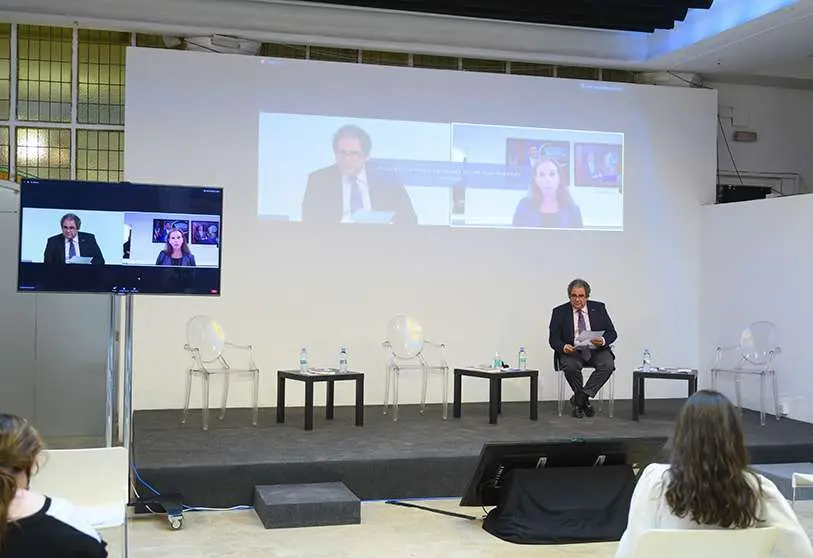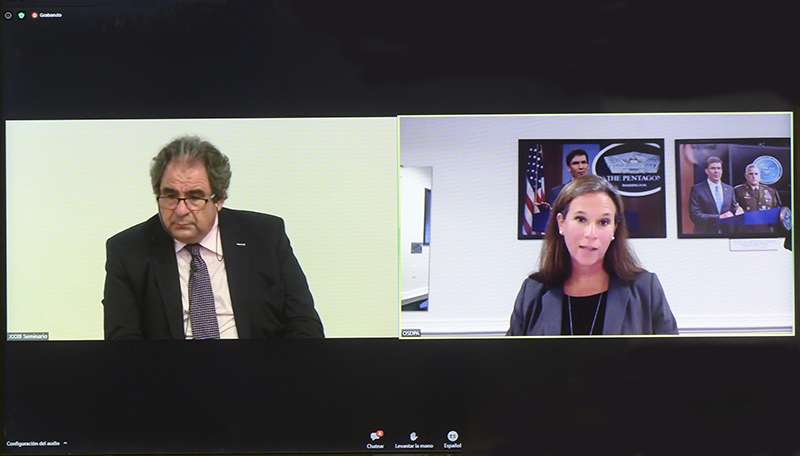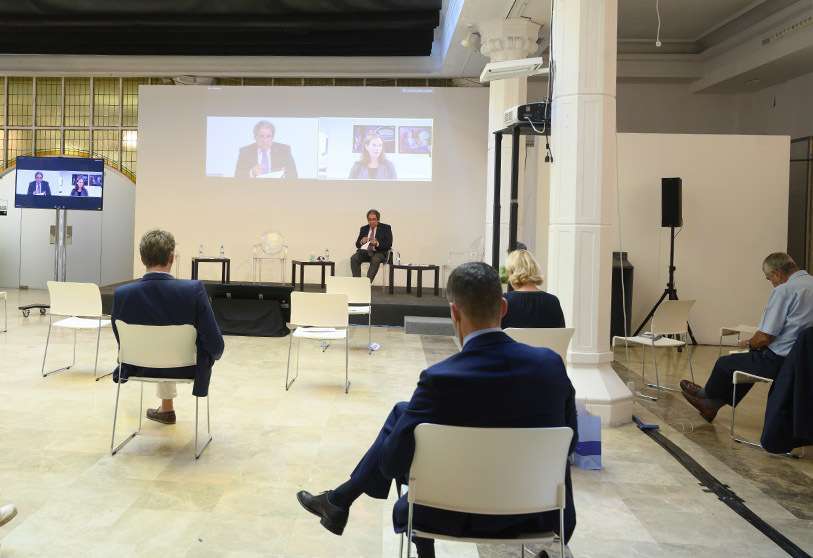Madeline Mortelmans of the US Department of Defense: "Interfering with elections is the main objective of cyber attacks".

When did the Second Cold War begin? Some will say that, with Russian interference in the American elections in 2016, others will say 2014, when Moscow sent its troops to Ukraine, and still others when Donald Trump, already president of the United States, imposed tariffs on Chinese products, initiating a trade conflict between the two powers, and in a short time Washington and Beijing were plunged into a technological war aimed at dominating telecommunications.
The new reality of the 21st century, where the battlefield has moved from traditional spaces to cyberspace, has made protection against cyber attacks one of the main concerns of governments. It is on this point that the fifth and final table of the day of the 32nd International Seminar on Security and Defence, organised by the Association of European Journalists, revolves.

Under the name "Challenges of Cybersecurity for the 21st Century", the Senior Director for Cybersecurity Policy at the U.S. Department of Defense, Madeline Mortelmans, has spoken about the threats, challenges and issues facing the United States, with a presidential election just around the corner and cyber security as a major campaign issue. Moderated by Javier Fernández Arribas, director of Atalayar and international vice-president of the Association of European Journalists, they spoke about the race for control of cyberspace.
Security threats are advancing, changing and changing rapidly. Cyber threats, cyber espionage, new technologies, transnational organized crime are some of the intimidation that threaten the stability of governments.
"Iran, China, Russia and North Korea are increasingly taking on malicious activities," said the State Department's Director of Cybersecurity.
Mortelmans noted that the United States' strategy in cyber security is to anticipate threats. "We must be able to defend ourselves from what is coming. Just as we do on land, at sea and in the air, the U.S. Department of Defense is involved around the world to ensure that these threats do not reach our nation. To this end, the main task of the Armed Forces and intelligence agencies is to find information.
Once this information is found, the Department's strategy, as Mortelmans notes, is to "publish the threats to contribute to international security".
These deterrence exercises are not comparable to those carried out a few decades ago in the nuclear field. On the contrary, as was the case in the nuclear field, a cyber attack "does not necessarily require a cyber response", as operations in this field are more complex than in the nuclear field as it is not always known who is behind it and because the cyber tools are always in use. "The United States' military capability we know has a very important deterrent effect", Mortelmans points out, but even so, the United States is not exempt from these attacks.
"We have seen clear examples of the use of malicious cybercrime that has affected key infrastructure services, such as those suffered in 2017, which had significant security consequences", the cybersecurity expert pointed out. Mortelmans was referring to the ransomware attacks known as WannaCry that infected 300,000 computers in more than 150 countries and affected hospitals, including many belonging to the UK National Health Service. At the time, Washington blamed North Korea, which Pyongyang denied and described as a "serious political provocation".
Attacks on health services, research centres and laboratories are now being targeted by cybercriminals. The vaccine for COVID-19 has become one of the country's most precious treasures and the country that manages to develop an effective cure will be at the forefront of the global governance race. This is another focus of the cybersecurity strategy.
At this point, collaboration is seen as a top priority, not only among US agencies themselves, which as the Defense Department official has pointed out, with the alliances signed with the FBI when it comes to sharing information. "We have a very complicated structure. Each agency has a different role, with the Department of the Interior dealing with critical infrastructure," she explained.
But cooperation with the European Union in the field of security is also becoming necessary. "We share the same values and both (for the US and the EU) have benefited from a common system and depend on the internet to develop our strategies", Mortelmans pointed out. Both the EU and the United States are allies in the North Atlantic Alliance (NATO) and work together in the Organisation for Security and Cooperation (OSCE) to promote security in cyberspace. With respect to a possible attack on a NATO member, the US expert has warned that "the normal mechanisms of the Alliance" will be used, when asked about the possible activation of Article 5.
The proximity of the presidential elections in the United States has once again aroused concern about possible foreign interference-it could be Russian or Chinese, as happened in the 2016 elections.

"We in the Department of Defense are making an effort to respond to threats to our elections. The Director General has issued a statement pointing to countries such as China and Russia," said Mortelmans, who differentiated between the Russian and Chinese intervention: "From Beijing, there are long-term coordinated campaigns that are trying to erode our economic and defence advantages, such as intellectual property theft. It is in Moscow's interest to prevent certain activities from functioning properly".
With the elections in mind, but on another issue such as questions relating to the behaviour of technology companies, Mortelmans has pointed out that they are working on this and that there are alliances with different departments in order to be able to work in collaboration with internet giants such as Facebook or Microsoft. "When dependency increases, vulnerability increases. We are aware and believe that we have to be able to defend our nation," concluded the director of cyber security.








